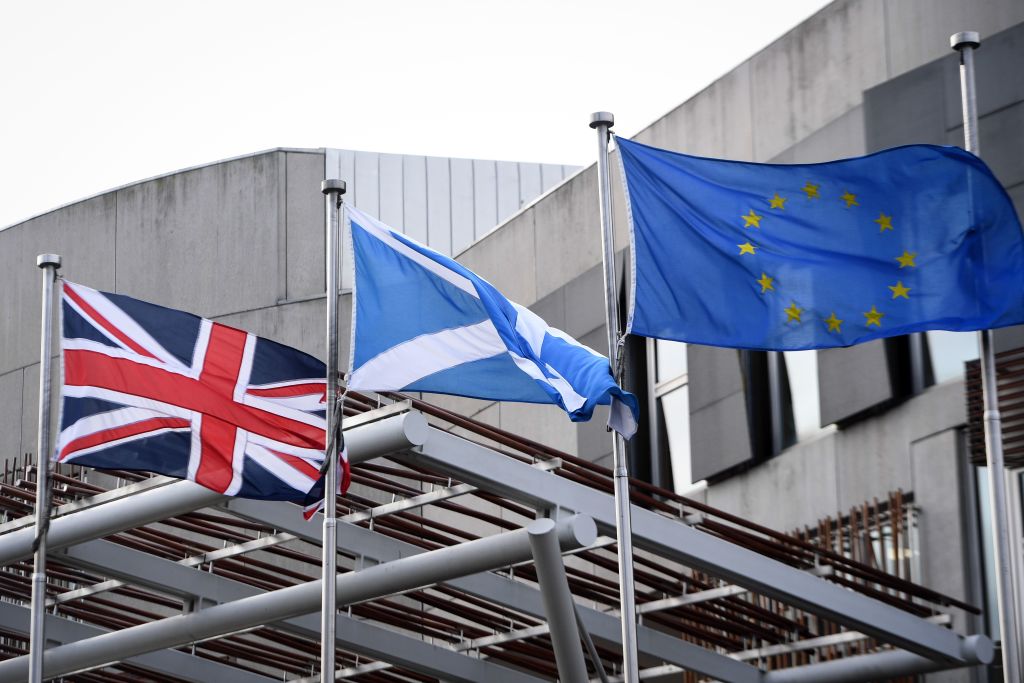
As jubilant Brexit supporters gather to celebrate the U.K.’s departure from the European Union, Scotland is digging in to its position as the last bastion of political resistance.
The EU’s royal blue flag with yellow stars will continue flying at the entrance of the Scottish Parliament in Edinburgh. The legislature, dominated by the pro-independence Scottish National Party, voted again this week to try and force another referendum on breaking away from the rest of the U.K. and ultimately rejoining the continent’s single market.
First Minister Nicola Sturgeon calls Brexit an “affront to democracy” because Scotland voted overwhelmingly to stay in the EU in 2016. As the country officially leaves at 11 p.m. U.K. time on Friday, Sturgeon is repeating her vow to give Scots the chance to choose their own future. Her problem is that Prime Minister Boris Johnson is refusing to grant the power she requires to hold a legal vote on independence.
“Brexit and everything that will flow from it is happening despite the will of the majority of the Scottish people,” Sturgeon told the parliament in Edinburgh earlier this week. “It is beyond doubt now that the only realistic way for Scotland to return to Europe is to become an independent country.”
One of the underlying themes of Brexit has been the rumbling standoff between the two largest constituent parts of the three-centuries-old United Kingdom. After Scots voted to remain in the U.K. in 2014, less than two years later the U.K. as a whole decided to leave the EU. Since then, the political division has become even more entrenched.
Lighting Candles
In Edinburgh, which voted to remain in the EU more than any other British city, demonstrators are due to gather outside the parliament later today to lament the end of the U.K. 47 years of EU membership. The event, called “Missing EU Already,” will culminate with a candle-lit vigil.
The Scottish Government said two of its main buildings, St Andrew’s House in Edinburgh and Victoria Quay in Glasgow, will be lit in the blue and yellow colors of the European flag on Friday.
Scots voted 55% to 45% to stay in the union with England and Wales in part because the U.K. was an EU member. Polls suggest the country is still split and the result of any new vote would be too close to call. A Yougov Plc survey of 1,039 voters age 16 or over published on Thursday found 51% to 49% in favor of independence.
Sturgeon says Brexit means Scotland should be allowed to vote again. At last month’s election that handed Johnson the power to push through Brexit, the SNP won 48 of Scotland’s 59 districts on a platform of demanding a fresh decision on independence.
But it took less than an hour after Wednesday’s vote in the Scottish Parliament for another referendum for the result to be rejected by Secretary of State for Scotland, Alister Jack. He repeated the U.K. government’s argument that the 2014 vote was a “once-in-a-generation” opportunity. The ruling Conservatives also said it was a “day of embarrassment” for the Scottish Parliament to debate whether to keep the EU flag flying.
That leaves Sturgeon and Johnson at loggerheads, and tensions between Scotland and England, which came together to form Great Britain in 1707, are likely to multiply. Johnson is seeking a quick trade deal with the EU and Sturgeon is headed toward a Scottish Parliament election next year determined to put the issue of full autonomy back to the people.
Keep Coming
There’s also a growing dispute over immigration and the future of foreign nationals living in the U.K. The Edinburgh-based government earlier this week put forward plans for a special Scottish visa designed to encourage people to move to the country, which is at risk of a labor shortage.
Sturgeon’s semi-autonomous administration, though, isn’t responsible for Scotland’s immigration policy and the proposal was rejected outright by the U.K. government.
“This is the human element of Brexit,” SNP lawmaker Fiona Hyslop said, citing the contribution to Scotland’s economy by the 300,000 or so EU nationals living there. Leaving the EU flag outside parliament is an important signal to them that they’re welcome and valued in Scotland, she said.
More Must-Reads from TIME
- Donald Trump Is TIME's 2024 Person of the Year
- TIME’s Top 10 Photos of 2024
- Why Gen Z Is Drinking Less
- The Best Movies About Cooking
- Why Is Anxiety Worse at Night?
- A Head-to-Toe Guide to Treating Dry Skin
- Why Street Cats Are Taking Over Urban Neighborhoods
- Column: Jimmy Carter’s Global Legacy Was Moral Clarity
Contact us at letters@time.com